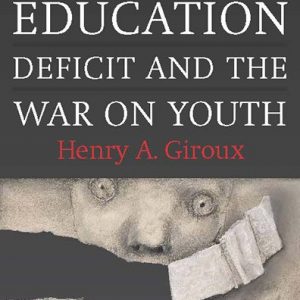America’s Education Deficit and the War on Youth: Reform Beyond Electoral Politics
reviewed by Decoteau Irby — November 15, 2013
Title: America’s Education Deficit and the War on Youth: Reform Beyond Electoral Politics
Author(s): Henry A. Giroux
Publisher: Monthly Review Press, New York
ISBN: 158367344X, Pages: 224, Year: 2013
In his most recent book, America’s Education Deficit and the War on Youth, social critic and author Henry A. Giroux examines neoliberal and neoconservative attacks on public education and youth in the United States of America. His central argument is that schools are becoming less capable of preparing citizens with the critical minds, willingness to challenge authority, and hope to fulfill their social commitments to advancing a democratic society. Instead, rising tides of market, religious, educational, and military fundamentalisms contribute to “a growing political and cultural illiteracy” (p. 29) that reflects among other things an inability, on the part of the public, to understand the mutually informing relationship between private problems and broader public issues. These growing illiteracies constitute what he refers to throughout the book as an education deficit. Throughout, he emphasizes the ways these fundamentalisms disproportionately target society’s most vulnerable population—it’s youth. Giroux uses the roughly 240-page book to both analyze the roots of the education deficit and challenge it by linking education to social change and protecting and creating public spheres where critical pedagogy can thrive.
Chapter One opens with an explanation of “the Big Lie.” Giroux elaborates on the education deficit, its roots, and its tendency toward market authoritarianism. He describes the education deficit as a crowning achievement of neoliberal capitalism that reframes democracy and freedom as an individual’s ability to consume in a ‘natural’ free-market, be competitive, and act in one’s individual interest. A market-based framing of democracy, he argues, usurps concepts of the public good. It undermines rights to challenge authority, refusal to conform, and dissent (p. 34). The ideas Giroux presents in Chapter One, including explanations of the four fundamentalisms, provide conceptual grounding for the subsequent chapters. The following chapters cover a broad range of topics from the pervasive racism and violence that plagues the U.S., media and the role of so-called intellectual right-wing pundits, the politics of the school curriculum, to the critical need for teachers, academics, and activist to be public intellectuals, and the militarism that characterizes U.S. domestic and foreign policy…

Comments are closed.